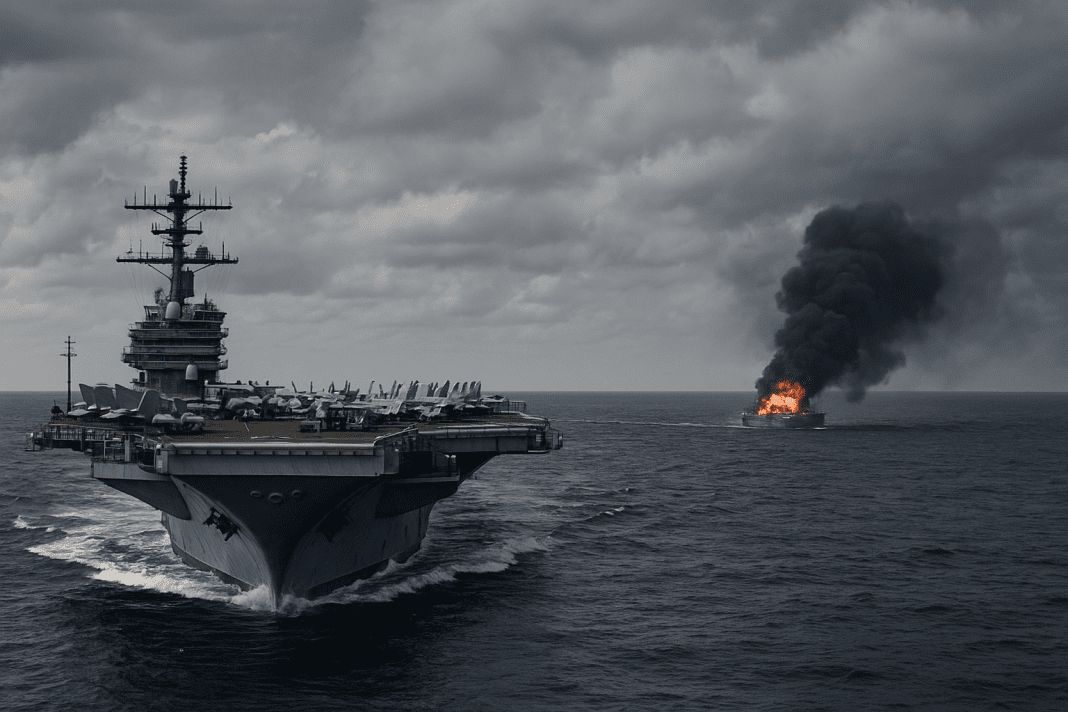Tensions in the Caribbean spiked after Venezuela announced that its security forces had captured what it described as a “mercenary group” allegedly connected to the United States Central Intelligence Agency (CIA). According to Venezuelan Vice President Delcy Rodríguez, these mercenaries were supposedly planning to carry out a “false flag” attack — an operation meant to appear as though it was done by someone else — to start a military conflict involving Venezuela.
Venezuela Claims Capture of Alleged CIA-Linked Mercenaries
Rodríguez made the explosive claim in an official statement on Sunday, warning that the alleged operation was unfolding “in waters bordering Trinidad and Tobago or from Trinidadian or Venezuelan territory.” She said the goal was to “generate a full military confrontation with our country.”
The Venezuelan government has accused foreign forces of repeatedly trying to destabilize the country. This latest claim adds to a long list of allegations made by Caracas against Washington. Rodríguez said Venezuelan forces captured the mercenaries using direct information from the American intelligence agency, CIA. However, she did not reveal concrete proof, such as how many mercenaries they detained, who they were, or what authorities seized during the operation.
The announcement came just hours after President Nicolás Maduro appeared on national television to announce that Venezuela had suspended its energy cooperation agreements with the nearby island nation of Trinidad and Tobago. Maduro accused the neighboring government of being complicit in what he called “acts of aggression” against Venezuela, although he too did not provide any physical evidence to support the claim.
Venezuela Draws Historical Parallels and Warns of U.S. Mercenary Involvement
In her televised statement, Rodríguez compared the alleged mercenary plot to two major historical events often associated with U.S. military intervention — the 1898 explosion of the USS Maine near Cuba and the 1964 Gulf of Tonkin incident in Vietnam. Both events were used as justifications for the United States to enter wars, and Venezuela’s leadership suggested that the same tactic might now be in play to justify a possible military campaign against their nation.
Rodríguez claimed that the mercenary operation was part of a coordinated effort by the United States to create an excuse for direct involvement in Venezuela. She accused Washington of seeking “a pretext for aggression” under the cover of counter-narcotics or anti-terrorism missions.
The White House has not commented on the accusation. U.S. officials, however, have previously dismissed similar claims from Venezuela as propaganda designed to distract from internal problems. Over the past several years, Venezuela’s government has regularly accused foreign powers of trying to assassinate its leaders or overthrow the administration through covert action involving mercenaries and paramilitary groups.
The timing of this claim is notable because it comes amid growing U.S. military presence in the Caribbean Sea. In recent weeks, the Trump administration has intensified its counter-drug operations in the region, which Venezuelan authorities interpret as a sign of aggression.
War Secretary Pete Hegseth recently deployed the USS Gerald R. Ford Carrier Strike Group — one of America’s most powerful naval forces — to Caribbean waters. The group joined several other U.S. Navy ships already conducting operations in international seas. Washington says the deployment is aimed at dismantling drug trafficking routes, but Caracas insists it is part of a strategy to encircle and threaten Venezuela through covert mercenary activity.
U.S. Military Actions and Mercenary Allegations Deepen Regional Tensions
According to Pentagon sources, U.S. forces have conducted at least ten airstrikes on suspected drug-trafficking boats in the Caribbean and Eastern Pacific since September, killing over 30 alleged narco-terrorists. These operations are part of Washington’s campaign to weaken cartels believed to operate with Venezuelan government protection — a charge Caracas firmly denies.
The United States and Trinidad and Tobago are also holding joint military exercises near Venezuelan waters. Caracas claims these drills are a cover for planned attacks involving mercenaries, though Trinidad’s government has not commented.
Earlier this month, President Trump confirmed authorizing CIA covert operations in Venezuela and hinted at striking “land-based cartel targets.” The U.S. also maintains a $50 million bounty on Nicolás Maduro, whom it accuses of leading the “Cartel of the Suns.”
Venezuela insists its capture of alleged mercenaries proves U.S. interference, yet has provided no verifiable evidence. Independent confirmation is lacking, and no international body has verified the arrests. The accusations follow earlier claims by Maduro that the U.S. plotted a “false flag” attack on its own embassy in Caracas.
As tensions rise, both countries continue trading accusations across the Caribbean, with Venezuela alleging a mercenary plot and Washington staying silent.

